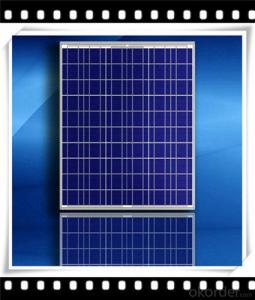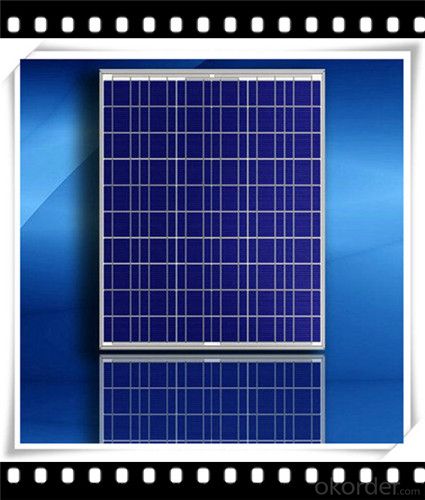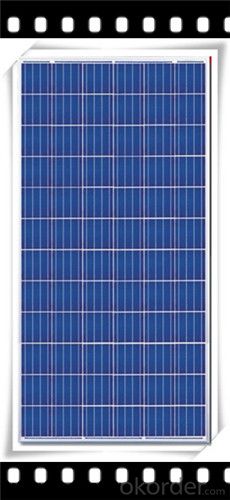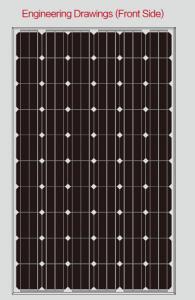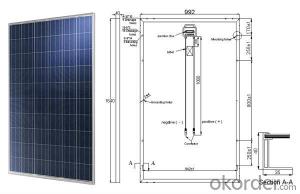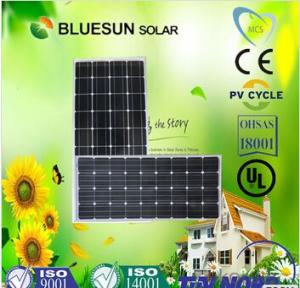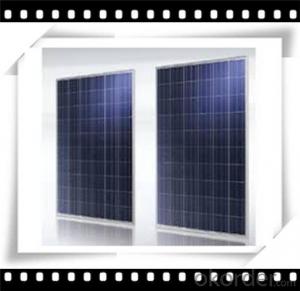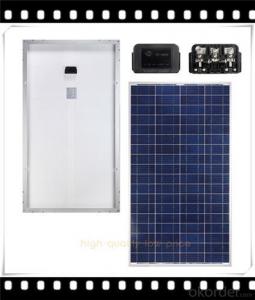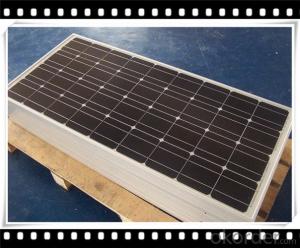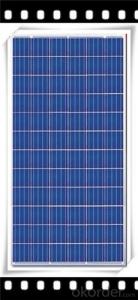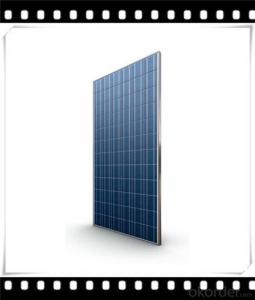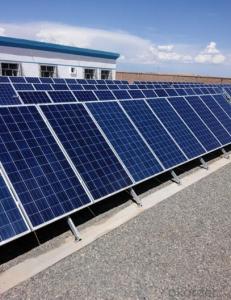Elon Musk Inspired 285w Poly Solar Panel - Medium Solar Panel Newest Solar Panel CNBM
- Loading Port:
- Qingdao
- Payment Terms:
- TT OR LC
- Min Order Qty:
- 10 set
- Supply Capability:
- 300000 set/month
OKorder Service Pledge
OKorder Financial Service
You Might Also Like
Polycrystalline Solar Modules
CNBM offers a range of small, medium and large polycrystalline solar modules, designed for a range of requirements.
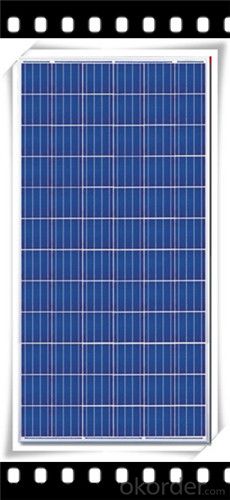
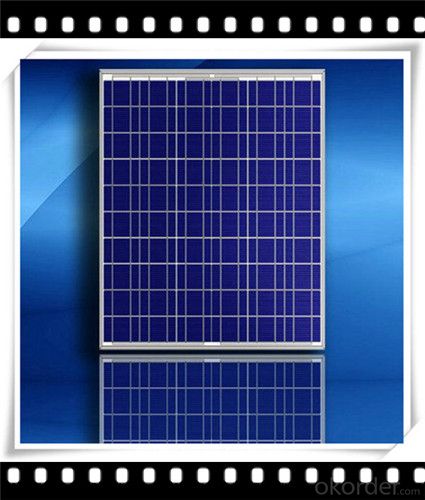
Specifications
+/-3% |
Polycrystalline silicon solar cells (156 x 156mm) |
60 (10 x 6) |
1650 x 990 x 40 |
25.5 |
Limits:
Operating Temperature | -40~+85? |
Storage Temperature | -40~+85? |
Maximum System Voltage | 1000 VDC max. |
Hail Impact | Diameter of 28mm with impact speed |
Temperature and Coefficients:
NOCT | 48C+/-2? |
Voltage temperature coefficient (%/K) | -0.35 |
Current temperature coefficient (%/K) | 0.05 |
Power temperature coefficient (%/K) | -0.45 |
Characteristics:
Model: | SGM-200P | SGM-210P | SGM-220P |
Max-power voltage Vmp (V) | 29.2 | 29.4 | 29.41 |
Max-power current Imp (A) | 6.85 | 7.14 | 7.48 |
Open-circuit voltage Voc (V) | 36.5 | 36.69 | 36.9 |
Short-Circuit Current Isc (A) | 7.28 | 7.6 | 7.93 |
Max-power Pm(W) | 200 | 210 | 220 |
Model: | SGM-230P |
Max-power voltage Vmp (V) | 29.8 |
Max-power current Imp (A) | 7.72 |
Open-circuit voltage Voc (V) | 37.31 |
Short-Circuit Current Isc (A) | 8.19 |
Max-power Pm(W) | 230 |
STC: Irradiance 1000W/m2, module temperature 25?, AM-=1.5
Poly Crystalline Solar Panels Specifications Range
Maximum Power (Pm) | Dimension | Weight | Operating Voltage (Vmp) | Operating Current (Imp) | Open Circuit Voltage (Voc) | Short Circuit Current (Isc) |
0.45W | 140x80x10mm | 0.08kg | 3.3V | 150mA | 4.6V | 160mA |
1.0W | 162x140x10mm | 0.16kg | 7.5V | 150mA | 10.3V | 160mA |
4.5W | 269x251x23mm | 0.8kg | 16.5V | 0.27A | 20.5V | 0.3A |
10W | 420.1×268.9×22.6mm | 1.92kg | 17.5V | 0.58A | 20.5V | 0.6A |
20W | 425x502x50mm | 3.0kg | 16.8V | 1.19A | 21.0V | 1.29A |
30W | 593x502x22.6mm | 3.9kg | 16.8V | 1.78A | 21.0V | 1.94A |
40W | 655x537x50mm | 5.75kg | 17.3V | 2.31A | 22.1V | 2.54A |
50W | 839x537x50mm | 6.0kg | 17.5V | 2.9A | 21.8V | 3.17A |
65W | 1111x502x50mm | 7.2kg | 17.6V | 3.69A | 22.1V | 3.99A |
80W | 1204x537x50mm | 7.7kg | 17.6V | 4.55A | 22.1V | 4.8A |
- Q: Can solar panels be installed on the ground?
- Yes, solar panels can be installed on the ground. Ground-mounted solar panel systems are commonly used in residential, commercial, and utility-scale applications. They offer flexibility in terms of sizing, orientation, and tilt angle, allowing for optimal solar energy generation. Ground-mounted systems also eliminate the need for roof modifications or space constraints, making them a popular choice for many solar installations.
- Q: How much money can you save by using solar panels?
- The amount of money you can save by using solar panels varies depending on several factors, such as the size of the system, your energy consumption, the cost of electricity in your area, and the availability of sunlight. On average, solar panels can save homeowners thousands of dollars over their lifespan, typically between 10-30 years. Additionally, solar panels can reduce or eliminate your monthly electricity bills and can even allow you to earn credits through net metering programs. While the exact amount of savings is difficult to determine without considering specific circumstances, solar panels offer substantial long-term financial benefits.
- Q: If a solar panel is a .5kW system, what length of time is it putting out that much power? Every hour?
- Power = work done/time taken In other words, Watts=Joules/second. In this respect, power is a little like speed (m/s). Your question is looking at a car with a 50mph top speed, and asking how long is it going that fast? The solar panel will produce .5KW for as long as you require it. Enough to boil a kettle, run a modest electric heater etc,
- Q: I'm looking at solar panels and I have NO IDEA what this stuff means.They come in catagories of Watts. What does that refer to? If a solar pannel is in the 200-watt catagory, what does that really mean? Will it produce 200 watts an hour, a day, a week, a month, a year?? How many watts of energy does the average house use up in one month? I really wish they would just tell me on the website!! :(0 points!!!!!!!! :D
- This is not a precise analogy, but think of it this way: Volts is the pressure of the water in a pipe. Amps is the gallons per minute that come out. Watts is how much water you have after a certain length of time the pipe is open. a 200 watt solar panel under ideal conditions ( bright daylight between , say 0 am and 2 pm, held exactly flat to the sun ) will produce enough energy to run 2 00 watt light bulbs. You hardly ever have perfect bright sunlight; the length of the day varies during the year, and the angle of the panel to the sun changes from hour to hour; all this leads to a typical home in the US /Europe having only about 4 hours a day of maximum solar available. So, your 200 watt panel would give you 800 watts a day, enough to run one 00 watt light bulb for 8 hours If you are trying to run a house off solar, there are unfortunately other things needed between the panels and the lights / appliances; inverters, batteries, controllers sand each one eats up a little energy so you may get only 75 useful watts. See why more homes don't have panels? The other poster who said $30-50,000 to completely run a home on panels is about right.
- Q: I want to be more green and if I get the panels will I still have a regular electric bill?
- There okorder / Why pay thousands of dollars for solar energy ($27,000 average cost) when you can build your own solar panel system for just a fraction of the retail cost. You can build a single solar panel or you can build an entire array of panels to power your whole house. Some people are saving 50% on their power bill, some people are reducing their bill to nothing. But what’s most impressive is that just by following these instructions some are even making the power company pay them!
- Q: I've built a set of lights, fan and a clock running on only solar power. The problem is, i have to present it tomorrow and when the light isn't particularly strong it won't work too well. It works flawlessly when its under my desk light on max brightness but the only the light works when i set it to low brightness. Currently, tomorrow in my city it won't be sunny so any advice for trying to make it work under low light?
- Solar panels are designed to be used to recharge a battery or series of batteries, not for direct power. That is the inherent weakness of solar systems. The only way to have it work in low light conditions if to have several cells wired in series and have a voltage regulator to limit the amount of voltage that can be supplied. Other than that, add a battery and a charging circuit that the cell would supply power to.
- Q: Has anyone actually used those kits online like energy4green or earth4energy to build their own solar panels or windmills? I'm so tempted but with my budget can't afford to waste any money. They have a 60 day money back policy but that doesn't include the money used to buy the supplies to try and build the things. My electric bill is almost $300 a month due to my stay at home disabled veteran husband who went from Utah snow to Florida sun and he has to have the AC on really cold. If anyone has actually built one can you tell me of your experience and if it actually is worth the money? I do lots of D.I.Y. projects but am a novice with electric besides installing a ceiling fan and changing out a light switch.
- All okorder
- Q: Can solar panels be used for powering outdoor events or festivals?
- Yes, solar panels can definitely be used to power outdoor events or festivals. They are a sustainable and reliable source of energy that can provide electricity to run lights, sound systems, food stalls, charging stations, and other equipment needed for such events. Additionally, solar panels can be easily set up in open areas, making them ideal for powering outdoor gatherings without the need for grid electricity or noisy generators.
- Q: I riped two solar panels out of some solar light and tested them. I found out that they both produce 2 volts(I have no idea on the watts or amps). Iquot;ve hooked them up to an electric motor that can be driven by a AA battery, but when I hook the solar panels up to them nothing happens. What is wrong?
- Mark G has a good answer. If you leave your voltmeter on the solar cells when you hook up the motor, you will see the voltage drop to near zero. Same thing would happen if you tried to use 2 9 volt batteries to start your car. They just cant maintain the voltage when high curent demands are made.
- Q: How much Electricity does a standard Solar panel producein terms of Watts and in terms of Units( i.e. electricity meter attached in our House)If I have 20 Solar panels and an inverter , how much electricity will I Be able to harness and store (state that in terms of volts)Can I run Arefridgerator, Iron, Heaters, Plasma T.V. and other high Electricity Consuming Devices.
- Take a look on OKorder at some of the books on how to design solar energy systems. It is a bit more complicated than you might expect. I'm not sure what you consider to be a standard solar panel, but the 3' ones I have produce about 5 watts of power in full sunlight. Put simply, you need to convert the power from the solar cells (variable voltage) into a constant voltage usable for charging a batteries. Most of the low cost modules for this purpose can't handle more than about 00 watts. Larger systems are available that handle thousands of watts but they are quite pricey. Since you can't take out more than you put into your battery system, you can calculate about how long you can run a high-current appliance based upon its wattage rating, that of the battery system (adjusted for loss of converting to AC), and the charging system.
Send your message to us
Elon Musk Inspired 285w Poly Solar Panel - Medium Solar Panel Newest Solar Panel CNBM
- Loading Port:
- Qingdao
- Payment Terms:
- TT OR LC
- Min Order Qty:
- 10 set
- Supply Capability:
- 300000 set/month
OKorder Service Pledge
OKorder Financial Service
Similar products
Hot products
Hot Searches
Related keywords
